Winter Olympics day 13: Recap the news and results from Beijing
One of the most recognised Winter Olympic stars has expressed her disappointment after failing to live up to her lofty expectations.
Winter Olympics
Don't miss out on the headlines from Winter Olympics. Followed categories will be added to My News.
Mikaela Shiffrin says the prospect of leaving the Beijing Olympics without an individual medal makes her feel like a “joke” and denied that the weight of expectation had been at the root of her misfiring performances.
The American, one of the most recognisable global stars of winter sports, insisted she had come to China at the peak of her powers in her quest to claim at least a third gold in three consecutive Games.
But the 26-year-old fluffed her lines, finishing just two of her five races. She slid out of her favoured slalom and giant slalom, as well as the combined in which she is reigning world champion.
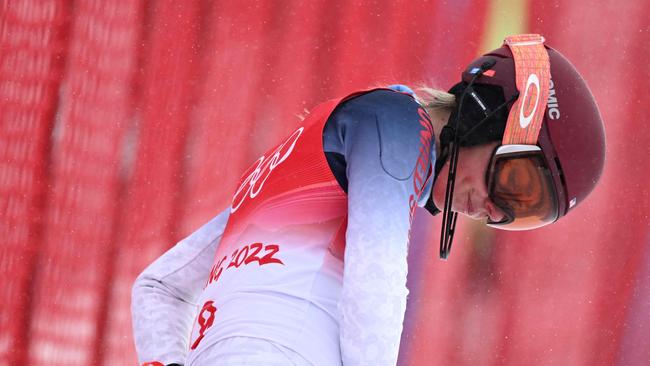
“Things were adding up to be just fine,” Shiffrin said.
“There have been challenges the entire way, but it didn’t give me a sign that things were not going to work. That’s the whole shebang in sport: you can have preparation, confidence... and sometimes it works and sometimes it doesn’t.
“And I literally have no idea why we keep coming back and doing it, especially after today!” - Pressure not a factor -
Shiffrin added: “If I look back on my whole career, I have a lot to show for that, it’s just not now.
“That’s disappointing for me, for my whole team... and anybody back home who woke up today and thought ‘she did a pretty good downhill run, set up pretty well for the slalom... of course she’s going to at least make it to the finish, this could just be the medal that salvages it all’.
“Right now I just feel like a joke.”
Shiffrin joked that she “should probably just quit”.
“But I’m going to come back out tomorrow and ski some parallel giant slalom because I’m that much of an idiot!” Shiffrin’s three-season streak as overall women’s World Cup champion ended with a sad season marked by the sudden death of her father Jeff in February 2020.
After he passed away she returned home to Colorado and spent more than 300 days off the piste. It was a year, she said, that “felt like 20 years”.
Last season, Shiffrin rebuilt by focusing on the technical events, the slalom and the giant slalom, culminating in a successful 2021 world championships in Cortina d’Ampezzo, where she finished on the podium in all four of her races and won the combined event.
Her success on the World Cup stage has seen her rack up 47 slalom wins in a total of 74 victories, second only to retired former teammate Lindsey Vonn in female racing.
The stars, however, failed to align at the Olympic skiing venue in Yanqing, north of Beijing.
First she slid out of the slalom and giant slalom before regaining some pride with ninth place in the super-G and 18th in the downhill.
The combined was her last chance for an individual medal, but that was shot down in flames as she skied out of a slalom section set by her own coach, Mike Day.
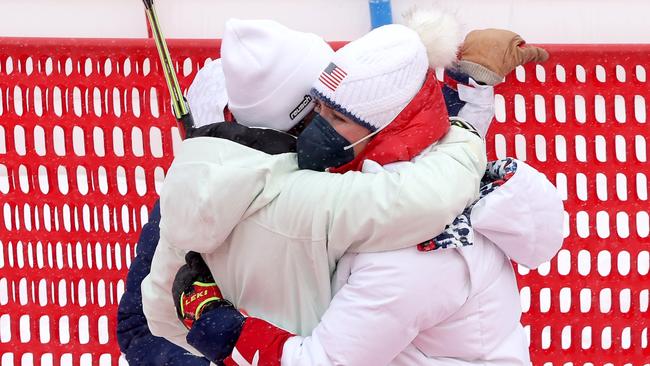
“People want to be able to say it’s a pressure thing, there are certainly points in the Games where I felt weight of pressures and expectations, but in general when I was racing it wasn’t something outrageous,” Shiffrin said.
“And it certainly wasn’t more than I’d experienced in my career before.
“The pressure is always there and I don’t feel uncomfortable or even unfamiliar with it.” Shiffrin admitted to feeling “really disappointed and frustrated”.
“I also know that there’s going to be a whole chaotic mess of crap that people are saying about how I just fantastically failed these last couple of weeks in the moments that counted.
“It’s really strange but I’m not even afraid of that, maybe because I have zero emotional energy to give anymore.”
Aussie equals best despite missing Steven Bradbury moment
Stroke survivor Sami Kennedy-Sim matched her best performance at the Winter Olympics when she finished eighth in Ski Cross at Beijing and says she wants to do it all over again.
Covered from head to toe in snow, the 33-year-old said she is already planning to compete at a fourth Olympics when the Games go to Milan-Cortina in 2026.
“What’s another four years, right? Nothing’s off the cards at the moment,” she said.
“I know that my family are pretty keen to come to Milan. Italian pizza, Italian pasta sounds pretty good.”
That the Manly skier ever made it to one Olympics is a minor miracle in itself.
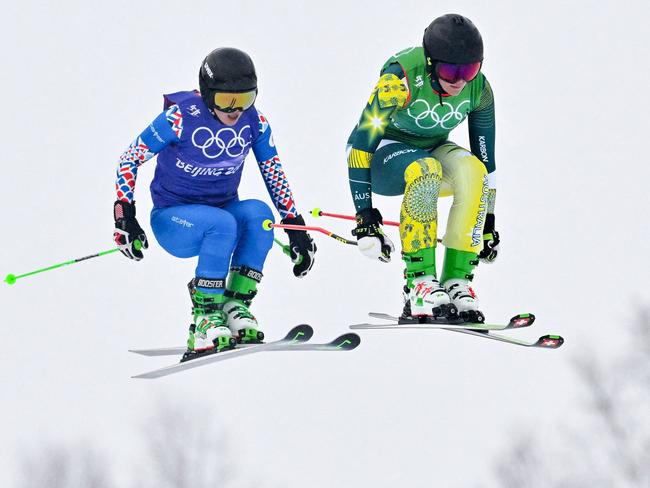
In 2013, she underwent heart surgery when she suffered a stroke after developing a blood clot following a minor knee operation.
Fit as a fiddle, she never thought she was a candidate for a stroke but got lucky because her husband recognised the symptoms straight away and rushed her to hospital.
That experience has given her a fresh perspective on her racing career that has now spanned three Olympics.
She was right in the mix on Thursday, making it through the first elimination round then winning her quarter-final with snow falling heavily and ACDC playing over the loudspeaker.
Needing to make the top two to qualify for the final, she came fourth but for a brief moment she thought she might get a stroke of luck when two of her competitors collided, almost knocking each other over.
“Anything can happen when you’re in an outdoor sport. It’s not a controlled environment and Mother Nature definitely showed up to play today,” she said.
“I was like, ‘come on, you beauty ‘this is the Steven Bradbury moment. This is what we all dream of in Australia’, but it didn’t happen.
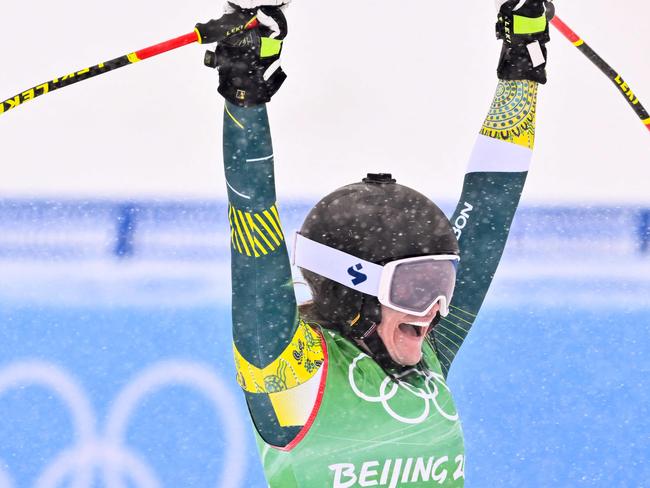
“I’m sure I will go back and I will watch this race and I will look at the things that happened in that semi-final and I’ll replay that and relive it for a while.
“But the beauty of Ski Cross is that the sport keeps moving. I’m really proud of the effort and obviously the number of the result doesn’t always dictate the journey.”
With her event so close to the finish of the Games and Chinese officials sticking to their strict Covid rules, Kennedy-Sim was the last member of the Australian team to arrive in Beijing.
She watched the Opening Ceremony on television from Germany and half her teammates had already gone home when she finally got to China but she will be among the handful left to attend Sunday’s Closing Ceremony at the Bird’s Nest.
“It stings a little bit because I’d love to walk out with my teammates (at the Opening Ceremony) and have that Olympic experience,” she said.
“But Ski Cross is always at the end of the programme, and when you’re here to perform you’ve got to think about that first.
“I’ve always gone to the closing ceremony and really celebrated with my teammates then and will again.
“I did pop open a bottle of champagne with my coaches and watched the Opening Ceremony. I had a cheeky glass and then got back on the bike that afternoon.”
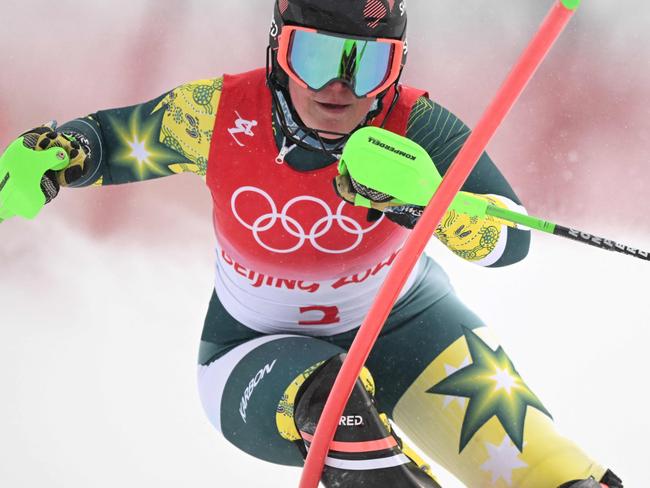
Small takes giant steps in Women’s Combined event
Australia’s Greta Small finished her Olympic campaign with a bang when she produced the best alpine result in two decades.
The 26-year-old from Wangaratta came 13th in the Women’s Combined event.
It was the best finish by an Australian alpine skier since Jenny Owens came ninth in the same event at Salt Lake City in 2002.
Small had finished 26th in the individual downhill and 31st in the Super G but saved her best for the combined event.
She was 18th after the downhill run but climbed five places in the slalom to finish 13th overall, ahead of some of the biggest in the sport, including American superstar Mikaela Shiffrin who failed to finish.
Shiffrin came to Beijing with high medal hopes in five events but has bombed out in them all and was scathing of her performances.
“Right now, I just feel like a joke,” she said.
“There’s going to be a whole chaotic mess of crap that people are saying about how I just fantastically failed these last couple of weeks in the moments that actually counted.
“It’s really strange but I’m not even afraid of that right now and maybe it’s because I don’t have any emotional energy to give any more.
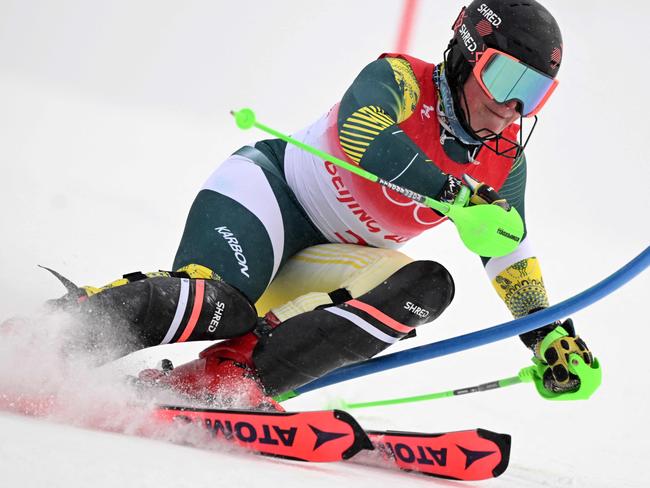
“People want to be able to say it’s a pressure thing. There are certainly points during the Games where I felt the weight of pressure and expectations. But in general, when I was racing, it wasn’t the case that that was something outrageous. It certainly wasn’t more than I ever experienced in my career before.
“The pressure’s there, it’s always there. I don’t feel uncomfortable or even unfamiliar with it. Some days I’m a little more tight and it’s still possible to ski well, and some days I’m a little looser and it’s still possible to ski well.
“Today I felt like I had a pretty calm, solid mentality, nothing too crazy. I of course wanted to win a medal, but before that I just wanted to take the opportunity to ski another run of slalom on this hill. The most disappointing thing, beyond walking away from the Games with no individual medals, the most disappointing thing is that I had multiple opportunities to ski slalom on this track, and I failed in all of them.
“The whole shebang in sport is that you can have preparation, you can have confidence, or maybe you’re not fully confident, you can have all of these pieces, sometimes it works, sometimes it doesn’t. I have literally no idea why we keep coming back and doing it. Especially after today.
“But I’m going to come back out tomorrow and ski some parallel GS, because I’m that much of an idiot. I don’t know why we keep doing it, but making good turns feels amazing. And I’ve been doing that these entire two weeks. I wish there was something to show for it.
“If I look back on my whole career, I have a lot to show for that, it’s just not now. That’s disappointing for me, it’s disappointing for my whole team, for the coaches, for everybody who’s been working so hard, and it’s disappointing for anybody back home who woke up and thought, especially today, ‘Hey, she did a pretty good downhill run, set up pretty well for the slalom’.”
Dark Peng Shuai admission in bizarre press conference
An extraordinary press conference at the Beijing Games has provided more twists and turns than the aerials skiers on topics ranging from Peng Shuai to Covid.
Proceedings opened with a Chinese Olympic Games volunteer professing to having no knowledge of tennis player Peng Shuai.
The official Beijing Olympics spokesperson Yan Jiarong has also angrily defended the country’s One China policy and Chinese medical experts claimed their extraordinarily draconian counter-measures have been so effective they have wiped out Covid-19.
It was also revealed that a Kyodo journalist from Japan was physically prevented from asking a question of a Hong Kong athlete in the mixed zone area after their competition.
Wei Yining, a volunteer for Beijing Olympics was at the press conference to talk about her pride in helping put on the Games.
She was asked if she knew of Shuai or her post on Weibo — where she claimed to have been sexually assaulted by a senior Chinese leader.
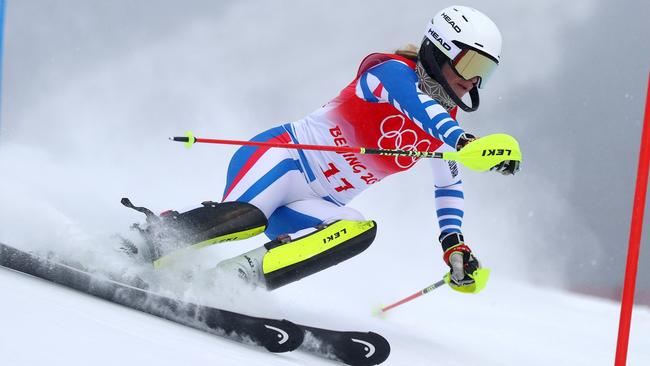
The issue has dominated western media, including Peng meeting with the IOC president Thomas Bach, but inside of China, behind the great firewall of internet censorship there is no knowledge of the matter.
Wei said in response to the question: “I am sorry I don’t really know that”.
Wei is one of the Games thousands of “volunteers” hand picked for their allegiance to the party and aspirations for higher office.
Remarkably, while there were hundreds of Covid infections within the closed loop of the Olympic venues, not one volunteer was infected, Beijing officials said.
After recording constant infections of around 30 to 50 a day inside the Olympic closed loop, including the Athletes Village, officials said on Thursday there are now no fresh cases.
Indeed, the Beijing official in charge of Covid prevention Chun Huang claimed the countermeasures have been so effective that as well as being no Covid in the closed loop at present, there have also been no breaches from the Olympic closed loop into the general society of China.
He said: “the successful implementation of the counter measures is a successful model for the Olympic Games and for future pandemic control in Beijing, it is a good reference. It will help us in the future.”
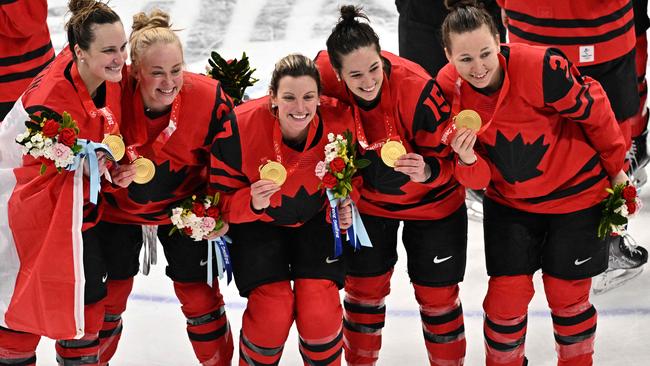
Nearly 500 Olympic participants were Covid-positive, many at the airport with historic remnants of the virus, and they were isolated in special purpose facilities for several weeks. The counter measures involved strict adherence to a mask wearing policy, with teams of “mask police” patrolling venues to ensure enforcement, social distancing, and daily pcr tests, including checking in and out of hotels each morning to obtain up-to-date Covid status.
Meanwhile, the BOCOG spokesman Yan interrupted the conference several times to deny that China is involved in forced labour camps in Xinjiang, and that Taiwan, called Chinese Taipei under Olympic rules, is not part of China.
Yan said: “I want to make a supplementary remarks. We take a solemn position, what I want to say is there is only one China in the world, Taiwan is an undividable part of China, it is a well-recognized international principle, we are always against the idea of politicising the Olympic Games”.
Then when a reporter asked about the provenance of materials in the Games uniforms and merchandise and whether some of the materials had come from Xinjiang using labour from Uighers, Yan replied: “These are lies from relevant groups, we are against the politicising of sports, thank you”.
Controversial Russian skater draws silent protest
Kamila Valieva skated to Kirill Richter’s “In Memoriam” during her controversial short program run, but the silence throughout her performance was deafening.
The 15-year-old Russian figure skater, who was ruled eligible for the 2022 Olympics women’s singles competition after a positive drug test surfaced last week, finished first in the short program with a score of 82.16. Many — including her opponents and their teams — have criticised the decision, made by the Court of Arbitration for Sport, to let her continue to compete as a full investigation into her positive test unfolds.
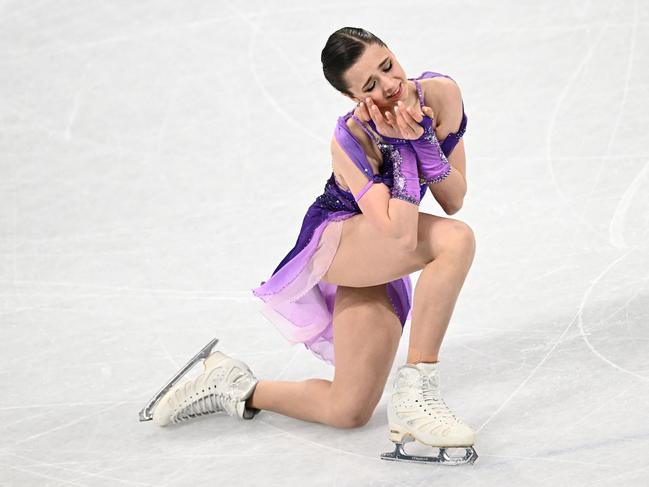
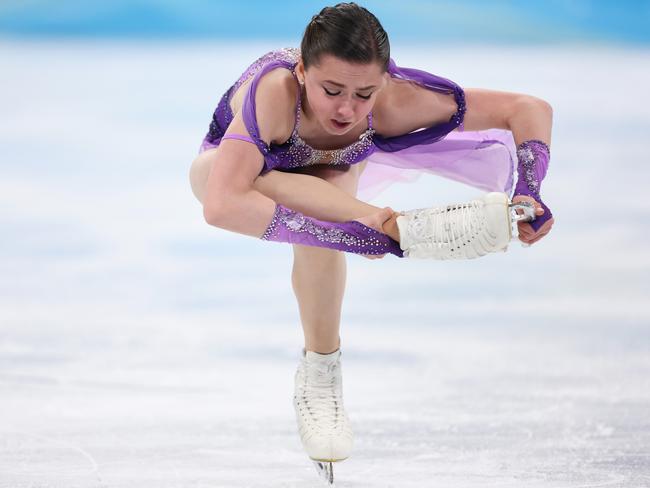
NBC’s figure skating broadcast team, comprised of former American Olympic skaters Johnny Weir and Tara Lipinski, was no different. Seemingly in protest of Valieva’s participation, the broadcast was nearly silent while Valieva was on the ice, only offering a couple of comments on her performance.
“All I feel I can say is that was the short program of Kamila Valieva at the Olympics,” Weir said bluntly as Valieva bowed to the audience.
“She had a positive test. We should not have seen this skate,” Lipinski added.
In the lead-up and aftermath of Valieva’s performance, however, Weir and Lipinski were vocal about their displeasure with Valieva’s ruling.
Thank you. pic.twitter.com/kp3IdYxine
— Johnny Weir (@JohnnyGWeir) February 15, 2022
Weir, who competed in two Olympics, apologised that Valieva’s doping scandal was “overshadowing your Olympics.” He previously said the controversy made him uncomfortable announcing the competition, calling it a “slap in the face to every other skater in this event.”
“With all of this news I just, I feel so uncomfortable as a skater and as a skating fan even having to commentate her performance simply because she should not be able to compete in this competition,” Weir said.
Those feelings persisted after Valieva’s performance Tuesday.
“That was the hardest event that I’ve ever had to cover,” Weir said in a video he posted on Twitter after the short program concluded. “And I want to thank you all for supporting the skaters that should be in this competition, whose life work is on the line. Thank you.”
Former Olympians Tara Lipinski and Johnny Weir condemn the decision to allow Russian skater Kamila Valieva to compete following a failed drug test.
— The Recount (@therecount) February 14, 2022
“This is a slap in the face to the Olympic Games, to our sport, and to every athlete that’s ever competed at the Olympics clean.†pic.twitter.com/tnn8WcPzf4
Lipinski, who at 15 — the same age as Valieva — became the youngest figure skater to win a gold medal in 1998, suggested Valieva’s participation tarnished the rest of the competition.“It’s not just about her skating or not skating,” Lipinski said. “It’s affecting everyone at these Olympic Games to think that there is going to be no medal ceremony in the ladies event if she’s on the podium. It’s otherworldly to me. I can’t even comprehend that. Imagine how that’s affecting so many other skaters’ lives and their Olympic experiences.
“It makes you question everything. These skaters give up their lives for this moment, to get to this place. Why?”
Valieva’s first-place finish qualified her for the free skate on Thursday, where she looks to build on today’s dominant performance to capture her second gold medal of the 2022 Olympics.
In the likely scenario she does take home a medal, however, there will be no medal ceremony: The official recognition will be postponed until a full investigation yields its findings.
- This article originally appeared in the New York Post
WHY SILENCE IS GOLDEN AT SCARY GAMES
Outspoken British Olympian Gus Kenworthy said Wednesday that he is biting his tongue while in Beijing because of the “very real risks” of criticising hosts China.
Kenworthy, a silver medallist at the 2014 Sochi Olympics, spoke out earlier this month against the decision to award the Winter Games to China because of the country’s “appalling” human rights record.
He told the BBC that “by actually taking a stance against them in a real tangible way you could probably make some positive change”.
But the 30-year-old freestyle skier has toned down his criticism since arriving in Beijing, telling AFP that he is “trying to just get through the Games safe and sound”.
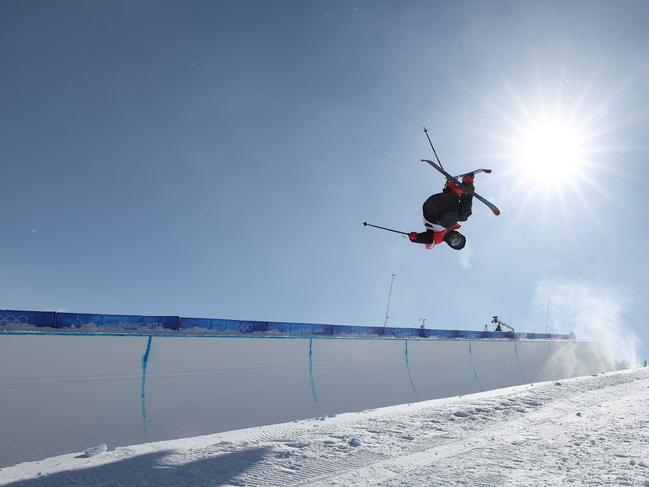
China warned ahead of the Games about athletes criticising the authorities while in the country.
“We are at the mercy of China right now,” said Kenworthy, who competed for the United States at two Winter Games before switching allegiance to Britain in late 2019.
“I just feel like there are very real risks of speaking right now,” he added. Kenworthy said “no one has censored” him but he has “been encouraged to tread lightly”, adding that he can “totally understand why”.
"It's still a brave step, not just to come out, but to live your life honestly and authentically,"
— Team GB (@TeamGB) February 16, 2022
Learn about @guskenworthy's truth as he prepares for the freestyle skiing men's halfpipe tomorrow in Beijing ðŸ³ï¸â€ðŸŒˆ#TeamGB | #Beijing2022pic.twitter.com/PdSC3YaHCS
But he intends to pick up where he left off when he returns home. “I don’t think I would want to be ruffling feathers in this exact moment anyway because I have to perform and I have to focus, so I’m just trying to do that and get through the Games,” he said.
“I think I can have a much bigger impact speaking up after the Games if I’ve just had a medal than if I don’t.”
Speaking in Beijing earlier this month, American figure-skating coach and former Olympian Adam Rippon said he hopes the Games will bring added scrutiny on the host country.
Kenworthy said it was “important for athletes to use their platform” and he has been outspoken on various issues in the past, including climate change and LGBTQ rights.
Kenworthy came out as gay after competing at the Sochi Olympics and he said the atmosphere at that year’s Games was “not welcoming” for LGBTQ people.
“We went through all sorts of media training with the US team on how to answer certain questions and they really didn’t want us to speak on that,” he said.
“I think that countries that participate in the Games or host the Games need to make sure that those athletes are supported and safe and that no minority group is being excluded or persecuted.” Kenworthy, who was born in England but moved to the US aged two, is now competing for Britain and said he “has had truly the best time being part of Team GB”.
He will compete in the freeski halfpipe in Beijing, beginning with Thursday’s qualification round.
“If I land my run I think I will do well, but it’s a judged sport so there’s really no saying,” he said.
“Ultimately it will come down to what I do and what other people do and how well they are executed.”
– With AFP and New York Post




